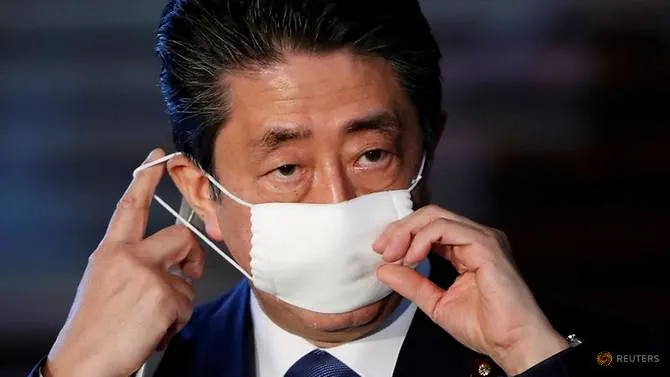Japan declares COVID-19 state of emergency, prepares practically US$1 trillion stimulus
08 April, 2020

Japanese Prime Minister Shinzo Abe on Tuesday (Apr 7) declared a state of emergency to fight new COVID-19 infections in major population centres, and unveiled a stimulus package he referred to as among the world's biggest to soften the monetary blow.
Abe announced the state of emergency targeting the administrative centre Tokyo and six other prefectures - accounting for approximately 44 % of Japan's population - for a period of about a month.
The other afflicted regions are neighbouring Chiba, Kanagawa and Saitama, the western hub of Osaka and neighbouring Hyogo, and the southwestern region of Fukuoka.
"We have made a decision to declare a state of emergency because we've judged that a fast spread of the coronavirus nationwide could have an enormous effect on lives and the economy," he told parliament earlier.
"The most crucial thing now is for every citizen to improve our actions," Abe said in televised comments made at a meeting of a government task force.
"If each folks can reduce connection with other people by at least 70 %, and ideally by 80 per cent, we should have the ability to visit a peak in the number of infections in two weeks," he said.
His Cabinet may also finalise the stimulus package worth 108 trillion yen (US$990 billion) - equal to 20 % of Japan's economic output - to cushion the impact of the epidemic on the world's third-largest economy.
That exceeds the 11 % of US output for the stimulus package laid out by President Donald Trump and 5 % of output for Germany's package.
In the package, the federal government referred to the pandemic as the "biggest crisis" the global economy has faced since World War II.
Abe said direct fiscal spending would total 39 trillion yen, or 7 % of the economy, more than double the total amount Japan spent following 2008 collapse of Lehman Brothers.
Japan has been spared the big outbreaks of the coronavirus observed in other global hot spots, but a recent, steady rise in infections in Tokyo, Osaka and the areas led to growing demands Abe to announce circumstances of emergency.
"WE WILL BEAT THE VIRUS"
Coronavirus infections in Tokyo a lot more than doubled to about 1,200 during the past week, with an increase of than 80 new ones reported on Tuesday, accounting for the best number in the united states. Nationwide, cases have climbed past 4,000 with 93 deaths by Monday.
The emergency gives governors the authority to ask people to stay in the home and businesses to close. Without penalties for ignoring the requests generally, enforcement will rely more on peer pressure and respect for authority.
Tokyo Governor Yuriko Koike said the location was in talks with the central government to choose what forms of facilities it could ask to close or curtail business hours, while reiterating there will be no restrictions on buying groceries and medicine.
"It could cause inconvenience in daily life, but I demand everyone's cooperation because lives are in stake," Koike told reporters earlier.
Abe has stressed that the state of emergency will minimize short of imposing a formal lockdown as observed in other countries.
"Although a state of emergency is declared, it won't mean a city lockdown as seen overseas," he said, pledging public transport would run as normal and roads would not be blocked.
Abe also urged japan persons to draw on the sense of togetherness seen following the country's devastating earthquake, tsunami and nuclear meltdown in 2011.
"We are again facing an excellent difficulty. However, if we interact once more with hope, we will rise to the task and move forward," he said.
"We will beat the virus, we will defeat the virus and we are able to overcome the ordeal of the state of emergency."
SUFFICIENT FOOD
Essential infrastructure like rail services, mail and utilities would operate, as will ATMs and banks, public broadcaster NHK said.
Minister of Agriculture, Forestry and Fisheries Taku Eto called on shoppers to remain calm.
"We are asking citizens to buy only what they need when they require it as there is satisfactory food supply no suspension is planned at food factories," he told reporters earlier, adding there was no sign of disruption to Japan's grain imports.
However the restrictions will increase pains the virus is inflicting on the world's third-largest economy, which is seen as already in recession as supply chain disruptions and travel bans chill factory output and consumption.
Metropolitan Tokyo alone accounts for about 20 % of Japan's overall gross domestic product.
Japan will sell an archive amount of additional bonds worth a lot more than 18 trillion yen to invest in the package, increasing its huge debt which is twice how big is its economy.
As the stimulus could ease the immediate damage from the pandemic, lawmakers are already calling for a great deal larger spending to avoid bankruptcies and job losses.
Analysts expect the economy, which shrank in the final quarter of this past year, to create two more quarters of contraction, piling pressure on the government and the central bank to do more.
"The government will most likely compile another supplementary budget soon to stimulate the economy with a lot more spending," said Takahide Kiuchi, a former Bank of Japan board member who's now an economist at Nomura Research Institute.
Abe also announced that in a bid to help ease the pressure on hospitals, people that have mild symptoms will be treated in hotels and other facilities - including some which were to be used because of this year's now-postponed Olympic Games.
The government in addition has pledged to step up testing capacity and the amount of beds and ventilators available to treat those in serious condition.
Source:
TAG(s):
